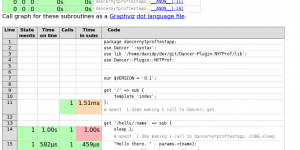Mark Allen will give a talk at YAPC::NA 2012 on the Dancer Perl web framework he describes as:
This talk presents the Dancer web framework beginning with “Hello World” and progressing through a couple of easy to digest introductory applications. All of the primary Dancer features are presented including URL routing, writing handlers, and output templating. A selection of useful and common Dancer plugins will also be covered. This talk is best suited for beginning and intermediate Perl programmers.
(via JT Smith, in turn via the YAPC::NA blog.)
I hope it’s recorded, as I’d like to see it, but won’t be able to afford to attend YAPC::NA.


